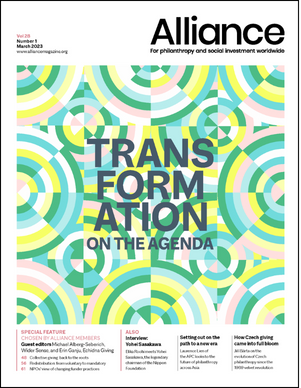For change to be truly enduring, it’s said that it needs to start from within. But that doesn’t mean external forces or pressures are irrelevant. Far from it. When it comes to philanthropy, a field notoriously immune from accountability to electorates or shareholders, such pressure can be reasonably applied though, in practice, it rarely is.
The regulation of philanthropy tends to be remarkably permissive in contemporary societies largely because government relies on private funding to compensate for insufficiencies of public provision. As non-profits are reliant on donors, their criticism is muted too. Given this force field of immunity, it is striking that a fair wind of criticism has built up in recent years calling for changes to philanthropy’s practices and institutional arrangements.
Today, it is common within philanthropy institutions and umbrella bodies to hear demands for more effective and equitable funding. Core and multi-year funding, general operating support, ‘pay what it takes’, participatory grantmaking, trust-based philanthropy and a host of other ideas dominate sector chat about improving the state of funder-grantee relations.
But transformation is more than change. Transformation requires ‘a more thoroughgoing shake-up of what we do and how we do it, reconsidering not only how we relate to the rest of society but how we behave and see ourself’, as we described it regarding our latest special feature.
Are philanthropists willing to donate more and pay more tax? To me, these are two litmus tests of a deeper commitment to social change. Yet, there is little evidence that such commitments will be realised by voluntary effort alone.
Is philanthropy willing to undergo such a deep transformation? Do calls to ‘decolonise’ philanthropy go far enough? Do the necessary and overdue improvements to donor-grantee relations obscure a more fundamental reckoning with how wealth is created, and where charitable endowments are invested?
As importantly, are philanthropists willing to donate more and pay more tax? To me, these are two litmus tests of a deeper commitment to social change. Yet, there is little evidence that such commitments will be realised by voluntary effort alone. And that’s why pressure from the outside – in the form of government action and regulation – could be just what’s needed to push philanthropy out of its comfort zone.
Arguably, the best thing which could happen to our field would be for governments to require foundations, donor advised funds and other tax privileged vehicles to pay out a certain portion of their assets each year. The latter already happens in the US, Canada and Australia, while CSR laws in India have done the same for companies with dramatic effect. Governments can go further by imposing wealth taxes on those who live off investments. After all, a reckoning with philanthropy is in a deeper sense a reckoning with wealth. Some philanthropists recognise their responsibilities but, on today’s evidence, few of them are ready to embrace the structural changes to our society, economy and politic so desperately needed.
The transformation of philanthropy which some crave will remain elusive while compulsion remains anathema. Ultimately, it’s still the case that our sector prizes donor freedom over social justice as the apotheosis of philanthropy.
While we debate the question of transforming philanthropy, it seems a timely moment to highlight that Alliance magazine has recently embarked on its own equity, diversity and inclusion audit. Our aim is to better understand how to provide the most inclusive platform possible, represent a diverse range of practitioners, and spotlight equitable practices from all regions of the world. We plan to share results and actions flowing from our audit later in the year.
We’re also happy to report that this issue’s special feature on transforming philanthropy was chosen by Alliance members. If you’d like a direct channel to editorial, becoming a member is a great way to participate in global conversations happening in philanthropy right now. Just drop a line to zibran@alliancemagazine.org we’ll sign you up to join Alliance as our latest member.
Charles Keidan is Executive Editor at Alliance magazine.







Comments (0)